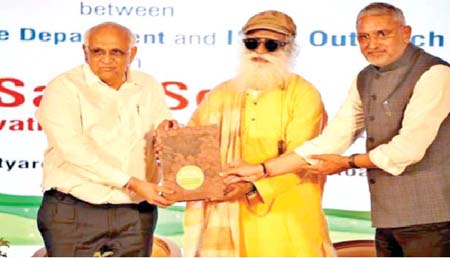Dirt beneath our feet goes unnoticed but it is on this that the world’s economic and social development is heavily dependent upon. Everyone may realise it one day, but Gujarat has understood the gravity of the issue and initiated steps to check the growing imbalance.
The State of Gujarat not only knows how to embark on a unique journey of development but also knows how to pioneer a few neo-well known movements in the developmental road map.
Signing MoU with Isha Foundation
In May 2022, the Western State became the first Indian State to ink an MoU with spiritual Guru Sadhguru’s Isha Foundation on a venture to ‘Save Soil’. The Climate Change Department of Gujarat inked the Memorandum of Understanding (MoU) to participate in the global movement for ‘Save Soil’. The objectives of this MoU are to prevent desertification, control salinity intake of soil and increase green cover area. It is true ‘Desertification’ in several parts of Gujarat has been a general cause of worry for years now. Hence, this was a timely intervention.

“Land is the fundamental building block for supporting all lives and livelihoods. Land degradation affects over two-thirds of the world today. If left unchecked, it will erode the very foundations of our societies, economics, food security, health safety and quality of life”.
— Narenda Modi, Prime Minister
In fact, close on the heels of Gujarat Government’s decision to ink the MoU, the neighbouring State of Rajasthan under Congress party also entered into an arrangement with Sadhguru’s Isha Foundation.
The Isha Foundation has prepared a ‘Soil Revitalisation Handbook’ and that has been handed over to officials and representatives of both the States.
PM’s Viable Solution
Desertification and degradation of soil are global challenges. In the words of Prime Minister Narendra Modi, “If left unchecked, this degradation will erode the very foundation of our societies, economies, food security, health, safety and quality of life”. Therefore, he said the human race has to reduce the tremendous pressure on land and its resources. Officials in Gujarat say most significant reasons for desertification in Gujarat are water erosion, salinity, wind erosion and vegetation degradation.
The State Government-run by the Bharatiya Janata Party has also taken multiple measures and initiatives in different parts of the State to ‘combat’ desertification.
Here are a few important areas of concern related to the crisis faced by soil on Mother Earth:
Population Growth
Over the last 100 years, it’s said the population has gone from less than 2 billion to over 7 billion. Alongside the population rise, the industrial revolution has made us more capable at consuming the Earth’s resources. As population size in developing countries grows, there is a rise in the already high demand on resources. This growth is damaging Mother Earth’s organs.
Loss of Biodiversity
The Isha Foundation notes say that Planet Earth is currently going through a drastic change. It is estimated that the current species extinction rate is between 1,000 and 10,000 times higher than the natural extinction rate.
Unsustainable Agriculture
Most of agriculture is now said to be ‘out of balance’, putting a lot of stress on Earth’s life support systems. Modern-day agriculture usually consists of a monoculture, which leads to unstable ecosystems. If a farmer grows only corn, there will be no habitat for predators which consume pests, leading to a need for synthetic pesticides.
The objectives of this MoU are to prevent desertification, control salinity intake of soil and increase green cover area. It is true ‘Desertification’ in several parts of Gujarat has been a general cause of worry for years now. Hence, this was a timely intervention
Also, there are ‘no species to cycle nutrients’ and fix soil nitrogen, leading to usage of chemical fertilisers. Deforestation is another area of concern.
Innovation and Initiatives
The Gujarat Government has taken up several initiatives in different parts to combat desertification. In the Banni region of Kutch, the State authorities have been working closely with stakeholders to replenish the grassland with Banni grass. This region is crucial for the rural economy of the Kutch belt.
A number of indigenous techniques are being promoted by the government to achieve land degradation neutrality.
## Surveys have revealed that soil-biology is at the heart of natural and cow-based farming. The Gujarat Government provides an assistance of Rs 900 per month to the farmers to switch towards cow-based farming. This also discourages/or avoids use of pesticides and chemical fertilisers. Notably, it is stated that breeds of cows can help increase the fertility and productivity of the soil.
To educate farmers in the State, the State Government is also guiding them through Bhaskaracharya Institute for Space Applications and Geoinformatics and e-gram centres.
Rightly goes a saying among a local community in Gujarat, ‘Dirt beneath our feet goes unnoticed but it is on this the world’s economic and social development is heavily dependent’.


















Comments